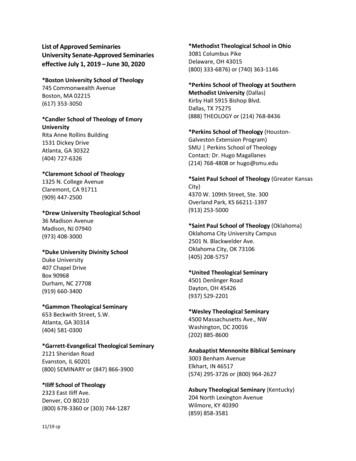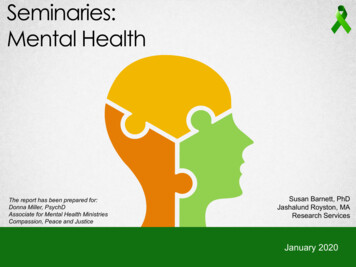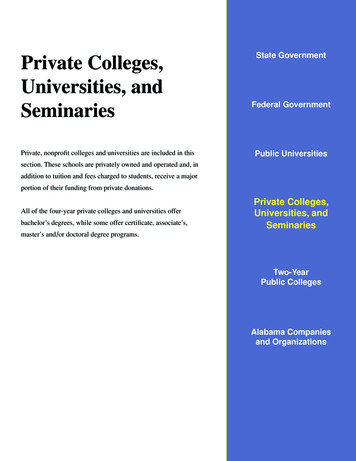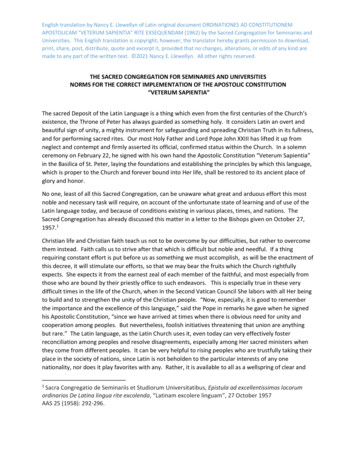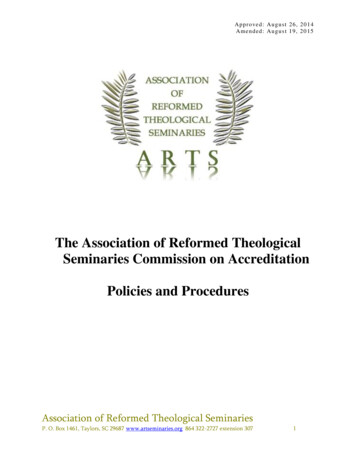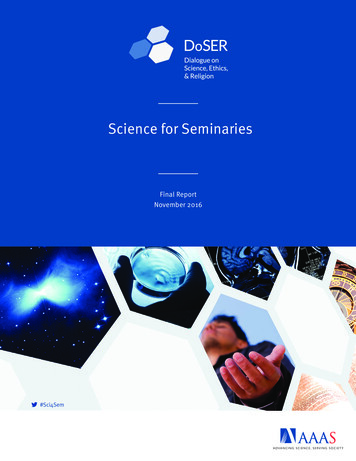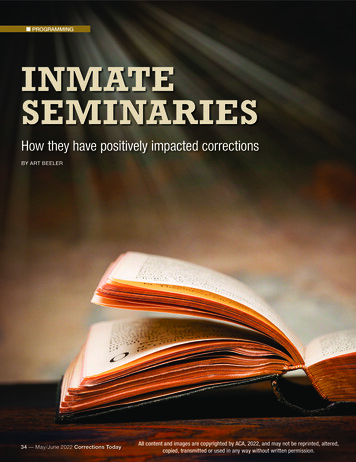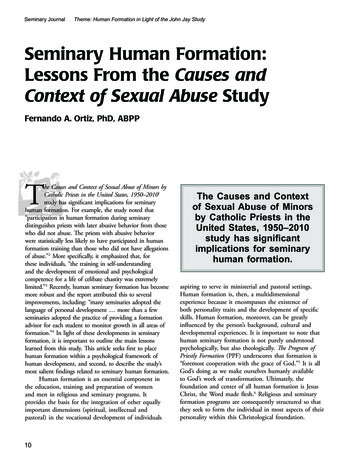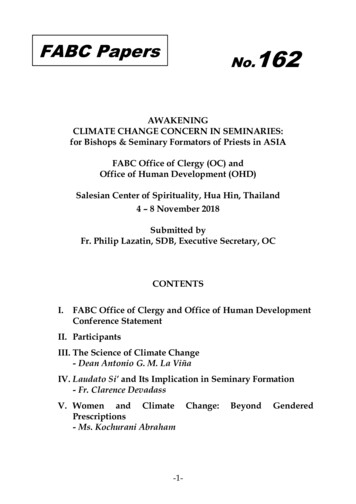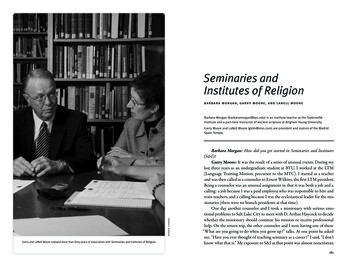
Transcription
Seminaries andInstitutes of Religionba r bar a m organ, garry m oore , and l ane ll m ooreBarbara Morgan (barbaramorgan@byu.edu) is an institute teacher at the TaylorsvilleI nstitute and a part-time instructor of ancient scripture at Brigham Young University.Richard B. CrookstonGarry Moore and LaNell Moore (gklm@msn.com) are president and matron of the MadridSpain Temple.Garry and LaNell Moore enjoyed more than forty years of association with Seminaries and Institutes of Religion.Barbara Morgan: How did you get started in Seminaries and Institutes(S&I)?Garry Moore: It was the result of a series of unusual events. During mylast three years as an undergraduate student at BYU, I worked at the LTM(Language Training Mission, precursor to the MTC). I started as a teacherand was then called as a counselor to Ernest Wilkins, the first LTM president.Being a counselor was an unusual assignment in that it was both a job and acalling: a job because I was a paid employee who was responsible to hire andtrain teachers, and a calling because I was the ecclesiastical leader for the missionaries (there were no branch presidents at that time).One day another counselor and I took a missionary with serious emotional problems to Salt Lake City to meet with D. Arthur Haycock to decidewhether the missionary should continue his mission or receive professionalhelp. On the return trip, the other counselor and I were having one of those“what are you going to do when you grow up?” talks. At one point he askedme, “Have you ever thought of teaching seminary as a career?” I said, “I don’tknow what that is.” My exposure to S&I at that point was almost nonexistent.181
182Religious Educator · vol. 11 no. 3 · 2010I had no idea what released-time seminary was, and I surely did not know youcould have a career teaching seminary.I think this other counselor must have talked to Marshall Burton, whowas in charge of hiring for S&I at the time, because a couple of weeks later Igot a call from Brother Burton saying, “I would like to talk to you.” I met withMarshall, and shortly thereafter he offered me a job.That left me perplexed. I really liked what I was doing at the LTM, and Iwas also ready to start a master’s degree in public administration. After careful consideration, LaNell and I decided to decline the S&I offer but toldMarshall we would reconsider S&I at a future time. Around Thanksgivingthat year, Brother Burton contacted me again and told me that one of theirteachers had been drafted into the military and again offered me a job. At thattime I was spending about sixty hours a week at the LTM, carrying a full classload in my master’s program, and LaNell was expecting our second child ina couple of weeks. After giving it prayerful consideration and finding out itwas possible to switch my master’s degree classes to night classes, we felt weshould give S&I a try.My first assignment was teaching seminary at Bonneville High Seminaryin Ogden, replacing Roger Fluhman (Brother Fluhman is currently the secretary to President Boyd K. Packer and the Twelve), who had been drafted intothe military. To my knowledge the first time I ever set foot in a seminary orinstitute building was when I walked in to the Bonneville Seminary that dayas a new teacher. I did not have the benefit of any preservice training only myexperience as a missionary and as a teacher at the LTM. I taught at BonnevilleSeminary for the rest of that school year and drove to Provo for my nightclasses. We went back to Provo for summer school. I taught the next year atBonneville and again returned to Provo for summer school.A note of possible interest: the S&I administrator was at that timeknown as “president,” and all of the administrative offices were locatedon BYU campus. Shortly after we arrived on campus the summer of 1968,under the direction of William E. Berrett, president of S&I, I and three orfour other teachers were asked to go to various parts of the United States toimplement a new home-study seminary program. The home-study programhad been piloted in the Midwest by Don Bond during the previous schoolyear and it had been decided to expand to other parts of the U.S. My assignment was to establish home-study seminary in the eastern part of the U.S.It was suggested that we might want to live somewhere near Pittsburgh,Seminaries and Institutes of Religion183Pennsylvania. The home-study seminary was completely unknown to members and priesthood leaders in the area; therefore it would be necessary forus to move to the East quickly and spend most of the summer contactingand training priesthood leaders and parents so the program could be readyto start in the fall.I accepted the assignment but now had a challenge. I was right in themiddle of my master’s program, and it became apparent that I would need todrop all of my summer classes and probably discontinue my master’s degreeprogram at BYU, since finishing the degree from back East did not seemlike a realistic possibility. On the other hand, if I continued my classes thatsummer, I would need only one more summer to finish the degree, and coming to Provo from the East for one summer seemed viable. I discussed mydilemma with the administrators. They wanted me to finish the degree, sothey suggested that we use a person back East to help me contact parents andpriesthood leaders and that I fly back and forth a few times during the summer to make sure things were organized and ready to go in the fall. It soundedlike a viable solution. Unfortunately we were never able to locate the personwho was to help me back East.As time passed it became increasingly difficult to know what to do. Weagain consulted with President Berrett and the S&I administrators. We allfinally agreed that it did not appear things would work out for the programor for us, so it was decided someone else would be asked to fill the assignmentand we would stay in Ogden. It was a hard decision because LaNell and I wereexcited about being a part of this new program. In fact, LaNell was in Ogdenpacking our few possessions in preparation for our move when I called andtold her it had been decided we were not going east and to start unpacking.Before she could finish unpacking, I was asked to take an assignment in theinstitute program located adjacent to the University of Calgary in Alberta,Canada. I called LaNell and said, “Honey, you may not want to unpack sincewe’ve been asked to go to Canada instead.”We accepted the assignment, and after summer school classes were completed, we and our two little boys headed for Calgary pulling a U-Haul trailerbehind our old car. When we got to the Canadian border, we spent manyhours trying to get into Canada. Nobody had told us that we needed a visa totake up residence there.We loved Calgary. We had lots of great students and a brand new building, and I was called as the elders quorum president of one of the student
Seminaries and Institutes of ReligionReligious Educator · vol. 11 no. 3 · 2010wards. I loved teaching the institute students, but it was an interesting experience because many of them were older than I was.The next summer we headed back to BYU so I could finish my master’sdegree. Partway through the summer we felt a strong impression that therewas something else we needed to be doing in the fall. That created a very difficult situation because we had really enjoyed our year of institute in Calgary.We were in no way unhappy with S&I, but we felt we needed to accept a joboffer in business that took us to Los Angeles and meant leaving S&I. We hadno interest in trying to raise our little boys in Los Angeles, but that is what wefelt we needed to do.LaNell Moore: Garry’s patriarchal blessing says that he would administer over many people. We assumed that would have to be in business. He hadfinished his master’s degree that summer. S&I had been a great experienceand we had thoroughly enjoyed it, but in our minds at that point S&I had notbeen a permanent career choice.Garry Moore: It was very difficult to do, but I resigned from S&I, andwe moved to Los Angeles, where I began work in the corporate offices of mynew employer, located in the tallest building in downtown LA. Shortly afterarriving I was called into the bishopric of our ward in Covina. As a bishopricwe could not find a teacher for our early-morning seminary class, so I volunteered to do that as well. I had a large class, about thirty-five as I recall, andI loved it. Phil Harris, who was my S&I coordinator, and Frank Hirschi, thearea director, kept talking to me about coming back into S&I. I kept tellingthem that I loved S&I but that we were doing what we felt we were supposedto be doing and that life was good.LaNell Moore: Garry was being advanced at work, and we just assumedthat is what we would do for the rest of our lives.Garry Moore: At one point, however, after Frank or Phil had talked tome again, I thought, “You know, I probably should give more prayerful consideration to this situation.” Therefore, one night after bishopric meeting Iasked the bishop if I could talk to him. I explained to him that I had just beenpromoted at work and that my superiors wanted me to make an importantcareer decision regarding my role in the organization. I also explained thatS&I had again offered me a job. After explaining my dilemma, I asked thebishop if he would give me a blessing since my step-father was not a member.In the blessing the bishop in essence said, “You should resign and go teachinstitute.” And I thought, “Wow, really?”185Courtesy of Gary and LaNell Moore184After retiring, Garry and LaNell Moore began service astemple president and matron of the Madrid Spain Temple.LaNell Moore: When Garry came home, I asked, “So what did thebishop say in the blessing? He replied, “We are supposed to resign and goteach.” I said that was fine, but I knew it might cause some disturbances.Garry Moore: The General Authority who interviewed me for reentryinto S&I told me that my stake president was upset because he felt that thebishop had overstepped his bounds and had no right to tell me what I shoulddo in the blessing. The stake president had never said anything to me aboutthe blessing but had apparently talked to the General Authority before heinterviewed me. The stake president was probably right about the principle.Nevertheless, I knew what I had felt when the bishop said I should go teach.A desire for clear direction was why I had asked the bishop to give me theblessing in the first place, and I had received it. It did not make the decisioneasy, but I recognized it was what I needed to do. In the interview I askedthe General Authority how he felt I should handle things. In essence, he said,“Well, I cannot tell you what to do, but we would sure be happy to have youback.”Having received the desired guidance, I resigned my position at work.The executive vice president over my part of the organization called me in andsaid, “OK, how much are they offering you?” When I told him (it was abouthalf of what I was currently making), he said something like, “Are you that
186Religious Educator · vol. 11 no. 3 · 2010unhappy here?” I said, “I am not unhappy at all. I really like it here.” He saidsomething like, “Will you please help me understand what you are talkingabout?” He spent a long time with me trying to understand why I would walkaway from something that was paying me a lot more money than I would getfrom S&I and that had the potential to pay me much more throughout mycareer. Although it did not make financial sense to the executive vice president (or to my parents or to us, for that matter!), when I left his office hecommented that he did not understand why I was leaving, but assured meit was nice to see someone doing what he felt was right rather than doingsomething just because it paid more money. He also assured me that if I everwanted to come back, he would help find a position for me. We have neverlooked back and have been blessed in every way, beyond our ability to express,including financially!I must say, however, that those two years working in business in LA haveproven extremely helpful to me. The experience of working in the head officeof a large corporation helped me begin to learn how to see things from a broadperspective, how to analyze and do things on a large scale, and many otherthings which were very significant preparations for me personally and muchappreciated experience for the over thirty years of administrative assignmentsI was asked to fill in S&I. It is just amazing to me how the Lord does thingswith our lives if we listen and trust him.I am obviously not a very good example of a typical S&I employee, but thatis how I got started and ended up making S&I a career—through both the backand the side doors. I really did not have any idea what S&I was when I started,but what a marvelous forty-plus-year experience it has been, one I would nottrade for any amount of fame or money. We are so grateful for the guidance wereceived early in our life that allowed us to have this incredible experience.LaNell Moore: At age fourteen or fifteen, Garry announced to his momthat he was going to quit the Church because the Sunday School superintendent had asked him to give a two-and-a-half-minute talk. He was much tooshy and lacking in confidence to stand in front of a group to talk. Miraculously,he gave that talk, and through the Lord’s tender guidance and rich experiences, such as a full-time mission, he ended up spending his life teaching andgiving talks.Barbara Morgan: Working in S&I has traditionally been viewed as anoccupation requiring sacrifice. What sacrifices did you make in choosing to workin S&I?Seminaries and Institutes of Religion187Garry Moore: If there was any sacrifice, it has certainly brought forththe blessings of heaven. You hear people talk about the financial sacrificerequired to work in S&I, but I do not think it has been much of a sacrifice forus. Undoubtedly, we would have had a much higher salary and earned a lotmore money over our career had we stayed in the business world. Nevertheless,I ask myself, how much has it been worth to me and my family to be able towork in the wonderful atmosphere and with the kind of people and studentswe have worked with in S&I? How much has it been worth to have the Spiritbe a daily requirement for my work and to be able to study and teach thescriptures? If there has been any financial sacrifice—and again I emphasize Ido not feel there really has been—it has certainly been worth it!When we started in S&I, I think our first year’s salary was a little over fivethousand dollars. That obviously was not a lot of money, but we have alwayshad sufficient for our family. At certain periods there was none to spare, butthere was sufficient. On the salary we received we were able to raise nine children, and LaNell has never worked outside the home. In the beginning years,our salary was based on the nine months of teaching during the school year,but we were allowed to have it paid over twelve months. That way we got acheck every month, but by spreading nine months of pay over twelve monthsit made for a smaller monthly income. During those first years I never hada part-time job during the school year, but I did find summer work to helpsupplement our income. During those summers I worked in oil fields, didroofing in Arizona, delivered mail parcels, and so forth. As S&I expandedacross the world, assignments began to require a twelve-month rather thana nine-month work year. For example, the S&I coordinator position, such asI was offered back East, requires significant summer work or there is no program in the fall. The year-round requirements of many S&I positions alongwith other factors eventually led to a proposal to the Board of Education foran eight-week summer employment option. This option was approved andallowed us to devote our year-round efforts to enrolling students, preparinglessons, and so forth. This greatly blessed the work, and it was also a greatfinancial blessing from the Brethren to us. The extra eight weeks of pay madeit so that I no longer sought temporary summer jobs.My S&I assignments were never an eight-hour-a-day, forty-hour-a-weekjob. There were many years of teaching night classes, early-morning seminarysupervision, weekend and night institute activities, student recruitment, andso on. During the last twenty-four years in the central office, my assignments
188Religious Educator · vol. 11 no. 3 · 2010required me to travel, often for weeks at a time, normally working fourteen- toeighteen-hour days and often seven days a week. I never thought of my assignments as a forty-hour week but rather whatever time it took to get the jobdone. Trying to do my best in my S&I assignments, fulfill demanding Churchcallings, and raise a large family left no time nor desire to have a second job.Frankly, I worry about those who try to be successful in their S&I assignmentand have another job on the side. I also worry about the increasing numberof S&I wives with children still at home who are working outside the home. Ifear both take a toll on them, their families, and their S&I assignment.Being able to do S&I work during the summers and be compensated forit has, in my observation, blessed our students, our programs, and our S&Ipersonnel immensely. After a few years we proposed to the Board that thesummer option be replaced with regular twelve-month compensation. Thiswas approved. The change has allowed teachers to receive the same amount ofpay each month, making it easier for them to qualify for home loans, bettermeet monthly obligations, and have paid annual leave. There were some whomisunderstood the change to a twelve-month commitment and thought thattheir vacation time had been taken away. The reality was that the supposedsummer vacation time was free time, but it was really leave without pay. Ihope S&I teachers today appreciate how generous the Brethren have been tous and will devote their year-round efforts to such important tasks as contacting and enrolling more students, improving teaching, having programs betterprepared, and so forth. I hope all realize what a blessing it is not to have toseek summer jobs or have a second job, and what a blessing the extra weeks ofpay are to our families!Going through the retirement process in preparation for our templeassignment, I have more fully realized how wonderful the benefits provided tous really are. We have much better benefits and retirement programs than mostpeople in the United States and certainly the world. As I said at the beginning,if there has been any element of sacrifice on our part, the blessings and the benefits we have received over our career in S&I far, far exceed any sacrifice.LaNell Moore: We and our children have also learned a great deal bynot having too much money. Necessity is the mother of invention. For us,real income was multiplied as capacities and talents were developed. In theprocess of trying to improve our situation, the Lord improved us.Garry Moore: And I believe the Lord has always provided us with morethan sufficient for our needs, and we have been able to live well. Eight of ourSeminaries and Institutes of Religion189nine children have served missions (our youngest daughter graduated fromcollege at age twenty and married before she was old enough to serve). Wenever paid for our children’s tuition or living expenses. That was not a decision caused by a lack of money. We believed the children would get a greatpractical education and would be blessed by learning to do it on their own.The basic principles of the welfare program—work, self-reliance, and stayingout of debt—are important for our children to learn early in their lives. Wetried to teach our children to save money for their missions, and the sevenboys, through early-morning paper routes (which sometimes just about woreme out) and summer work, had all or most of the money saved to do so. Thenwithout them knowing we were doing it, we paid for their missions. Whenthey returned home we were able to say to them, “Here is the money yousaved for your mission; now get your college education.” Our kids did pay(through scholarships, savings, and part-time work) for their own education, and eight of the nine (our oldest daughter married before finishing herdegree and helped put her husband through law school and start a family)have graduated with at least a bachelor’s degree, and several have master’sand doctorates. Almost all of them graduated with no school loans to repay.Financially, I do not think we or they have suffered or really sacrificed. I don’tshare any of this to brag or to sound like we had all of the answers. Every family has challenges, and we certainly had ours. However, the work environment,wonderful associations with colleagues and students, and even our financeshave protected, enriched, and blessed our lives in ways that all the money inthe world could not buy.One thing that some might view as a sacrifice is that most of the S&Iassignments we were asked to take necessitated a move. We lived a year and ahalf in Ogden, followed by a year in Canada. When we came back into S&Iwe moved and spent four years in Santa Maria, California, where I started afull-time institute program. Santa Maria was a wonderful place to raise a family. When we were asked to move back to LA to be the institute director atLong Beach City Institute and then the director at the Cal State Long Beachinstitute, it caused us some soul-searching. We went from a very nice home inSanta Maria to a very small home—about 1,200 square feet and no basement,with one bathroom for us and our seven kids. We had to be creative, so wecut an opening in the ceiling in one room and put in a pull-down staircase,put plywood over the rafters in the attic for flooring, and created a bedroomwhere the two oldest boys slept. The attic was not tall enough for an adult to
190Religious Educator · vol. 11 no. 3 · 2010stand up or to put in a real room with walls, but the boys loved it. They werehaving a Tom Sawyer experience.During that time I was called as bishop and also started my doctorate inhigher education at the University of Southern California (USC). We lovedour time in LA and in California. At the time we thought we were sacrificingto leave Santa Maria and move to Long Beach. In retrospect, our four years inLong Beach were a great blessing to us and our children. The Lord knew whathe was doing even when we were a bit doubtful.Our next move was from Long Beach to Washington DC. I was assignedto be the area director for the eastern half of the United States and the easternhalf of Canada. This meant literally moving from coast to coast. We lived inVirginia for five years and absolutely loved it. We would have stayed thereforever if we had not been asked to move to the central office in 1984. I guessI should just say that we loved each place we served and cried when we had toleave. I think it is very safe to say that we probably never would have venturedout nor made these moves on our own. The Lord was so good to us and ourfamily. Each new assignment and location brought wonderful new friendsand experiences. In California I had served in a bishopric, on two high councils, and as a bishop. While living in DC, I served in another bishopric, asbishop of two different wards, and in the stake presidency. I traveled all overthe eastern U.S. and eastern Canada working with more than forty coordinators and institute directors. We also added child number eight. The Lord wasso kind to provide wonderful growing experiences for us.While in Virginia I was able to finish my doctorate, which was an absolute miracle! I had taken all my coursework at USC while working full-timeand serving as a bishop, but I had not taken my oral and written exams norwritten my dissertation before we moved east. I had no idea how I was goingto pass my written and oral exams on courses that I had taken so long ago, orhow I was going to be able to be on campus at USC, or write my dissertation,with us living in Virginia. I had pretty well concluded that I was going to endup as another ABD (all but dissertation).Again the way was provided. As area director I had to fly to Salt Lake Citytwice a year, once for a budget review and once for the area directors’ convention. I “accidentally” found airline flights that allowed me to fly to SLC viaLA for only ten to fifteen dollars more than a direct flight to Salt Lake City.With the permission of the central office I flew to LA, worked with my chairman and committee for two or three days at a time, then flew to my meetingsSeminaries and Institutes of Religion191in Salt Lake. I still have a hard time believing I was able to pass my exams andget my dissertation finished without slighting my other responsibilities. I amvery aware that it would have been impossible without the love and supportof LaNell and the Lord’s help. There is also no question but that the Lordhelped me and us in more ways than we understand even today. One obviousexample of his help—tuition at USC was extremely high, and in those daysS&I did not provide the tuition assistance they offer today. When I tried topay my final tuition bill at USC, which was a large amount, the bursar’s officeinformed me, “You have already paid it, probably with your credit card.” Iinsisted that I had not paid it. I checked with the credit card company, andthere was no tuition charge. I again told USC that I had not written a checkand that the credit card company had verified that I did not pay the tuitionwith a credit card, to which they said, “Our records show that you did paythe tuition, and as far as we are concerned the matter is settled.” I told themwhere I could be reached when they realized their mistake and that I wouldpay what I owed them. I never again heard from USC, other than the alumniassociation inviting me to annually contribute to the alumni fund, which Ihave done for many years.LaNell Moore: By the time he got his doctorate, we had eight children.These were not sacrifices; they were improvements.Garry Moore: Each time we moved, we and our children had to leaveour home, our callings, and dear friends behind. This was always hard, buteach time we soon realized that the move also brought great blessings. Weretained our old friends and made new ones. We received new callings, andour new home was often better than the previous one. Even more important,each move gave us a chance to cut off all our outside influences and regroupas a family. In the process of the move, our family unity and interdependencewas strengthened. Even though there were challenges, I really do not believeour moves were sacrifices; rather they proved to have a positive impact on thefamily. When we moved from Virginia, our oldest son left on a mission aboutten days after we arrived in Utah. Our second son was entering his senior year,our third son was beginning high school, and our fourth son was in his lastyear of junior high. The move could have been traumatic for them. Thoughnot easy at first, it all worked out very well. We have been more blessed thananyone deserves to be blessed by every aspect of our career in S&I.LaNell Moore: These moves shaped our family tremendously. With eachmove we learned to grow where you are planted and with each move we grew
192Religious Educator · vol. 11 no. 3 · 2010closer together! Our move to Spain was our twenty-first.Garry Moore: The Lord was very kind to us. As we moved from place toplace a way was provided (not without some stretching, belt tightening, andleaps of faith) to afford housing in our new location. The timing of the moveswas not always what our wisdom would have said was ideal, but it all workedout. For example, in 1984 we had sacrificed and bought new carpet for ourhome in Virginia which was in our garage ready to lay when Stan Petersoncalled and asked me to be a zone administrator and move to Salt Lake City.The new carpet undoubtedly helped us sell our home more quickly and at abetter price, even though we never got to enjoy it! Neither LaNell nor I arefrom Utah, and we had no extended family in Utah, so moving to Utah wasnot on our wish list of places to live. In fact we had decided the DC area, eventhough it was completely across the country from our parents, would be ourhome indefinitely. When we moved to Utah, the only house we could feelgood about had only one of the three things we really wanted. Nevertheless,it has been a wonderful home and location for our family for the past twentyfive years. Not too many years after moving into our Utah home, throughmaking some extra monthly equity payments, we were able to pay off theremainder of our home loan. Not having a monthly house payment for several years helped us with missions and more.Our moves also provided opportunities for Church callings that we maynot have experienced had we stayed in one spot. Every experience and location provided a foundation for the next set of challenges and blessings. Thesewere not sacrifices. I have been overwhelmed with the blessings of the Lordin these callings and assignments. I spent almost thirty of my forty S&I yearsas a Central Office administrator or area director. I enjoyed these assignments,but I also loved teaching and the day-to-day interaction with the students.Barbara Morgan: What were your assignments for S&I after leaving thefield and going to the Central Office?Garry Moore: When Bruce Lake was called as a mission president, I wasasked to replace him as a zone administrator in the early spring of 1984. Ispent the next few months before our move to Utah as the area director in theEast and commuting to the Church Office Building for a couple of weeks at atime in my new zone administrator assignment. In those days each of the fivezone administrators had responsibility for some domestic released-time areas,some domestic non-released-time areas and some internationa
Seminaries and Institutes of Religion barbara morgan, garry moore, and lanell moore Barbara Morgan (barbaramorgan@byu.edu) is an institute teacher at the Taylorsville Institute and a part-time instructor of ancient scripture at Brigham Young University. Garry Moore and LaNell Moore (gklm@msn.com) are president and matron of the Madrid Spain Temple.

